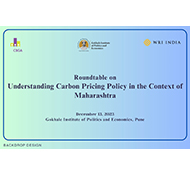Events
Roundtable on Understanding Carbon Pricing Policy in the Context of Maharashtra 13 December, 2023
Centre for Budget and Governance and Accountability (CBGA), Gokhale Institute of Politics and Economics, and World Resource Institute (WRI) India in a collaborative effort orchestrated an insightful discussion on December 13, 2023. The event was hosted at the Gokhale Institute and provided a profound exploration of the intersection between sustainable development goals, carbon pricing, and India's role in the upcoming COP 28 discussions.
The discussion sessions were rich in practical applications, covering topics such as cap and trade, carbon tax, and market mechanisms. Distinguished speakers emphasised the imperative of aligning projects with SDG goals, integrating carbon prices into project costs, and navigating the intricate balance between economic and environmental considerations. The event's focus extended to exploring challenges, including compliance issues and ethical considerations, offering a comprehensive perspective on the complexities surrounding carbon pricing at the state level.
The discussions underscored the significance of local-level problem-solving, featuring a pragmatic examination of the feasibility of implementing a carbon tax in a democratic country like India, with specific implications for Maharashtra. Overall, the event facilitated a nuanced understanding of India's distinctive position and potential in adopting effective climate mitigation strategies, contributing to the ongoing discourse on sustainable development and carbon pricing policies.
Key takeaways from the discussion were –
1. Implementation Disconnect: One of the key pain points identified is the gap between policy formulation and execution in India's mixed economy. The challenge lies in ensuring that carbon pricing policies are effectively implemented, addressing practical disconnects at the ground level.
2. Complex Application Procedures: The discussions highlighted the need for simplifying application procedures for carbon pricing mechanisms. The complexity of current procedures poses a significant hurdle, making it difficult for stakeholders, especially industries, to navigate the system effectively.
3. Industry Migration Concerns: The potential impact of state-specific carbon taxes on industry migration emerged as a significant pain point. Industries may be inclined to relocate to regions without carbon taxes, creating challenges in maintaining a balanced and effective approach to carbon pricing.
4. Aversion to Taxes: Both citizens and industries exhibit an aversion to taxes, hindering effective carbon footprint assessments and audits. The reluctance to conduct such assessments poses a challenge to understanding and managing carbon emissions efficiently.
5. Economic Impact on Vulnerable Groups: The event highlighted concerns about the economic impact of carbon taxes on small and medium-sized enterprises (SMEs), small farmers, and lower-income groups. The potential burden on these segments of the population raises questions about the equity and social implications of carbon pricing.
The expert panellists from the Indian Council for Research on International Economic Relations (ICRIER), Ecological Society, Prayas, Boston Consulting Group, Pune Knowledge, Tata Institute of Social Sciences (TISS),14 Trees, National Institute of Ecology and Climate Change (INECC), Clean Energy Network (CLEAN, MITCON Consultancy & Engineering Services Ltd, Gokhale Institute, World Resource institute, Praj Industries and PricewaterhouseCoopers International Limited (PwC)shared valuable insights on carbon pricing in India.
Past Events
- The Budget Dialogue: A Webinar on Union Budget 2024-25
- The Budget Dialogue: A Webinar on Interim Union Budget 2024-25
- Rajasthan Budget 2024-25: Workshop on Budget Priorities
- Roundtable on Understanding Carbon Pricing Policy in the Context of Maharashtra
- Roundtable on Instituting a Carbon Pricing Policy for India: Way Forward
- Roundtable on Exploring the Role of an Inclusive Carbon Tax Policy in Climate Mitigation Efforts of India
- The Budget Dialogue: A Webinar on Union Budget 2023-24
- Roundtables on Building an Inclusive and Cohesive Public Climate Financing Framework in Jharkhand and Rajasthan
- Roundtables on understanding the landscape of efforts in climate change mitigation financing for Green Economic Recovery of Odisha and Bihar
- Release of Study on Cost of Universalising Early Childhood Education (ECE) in India


